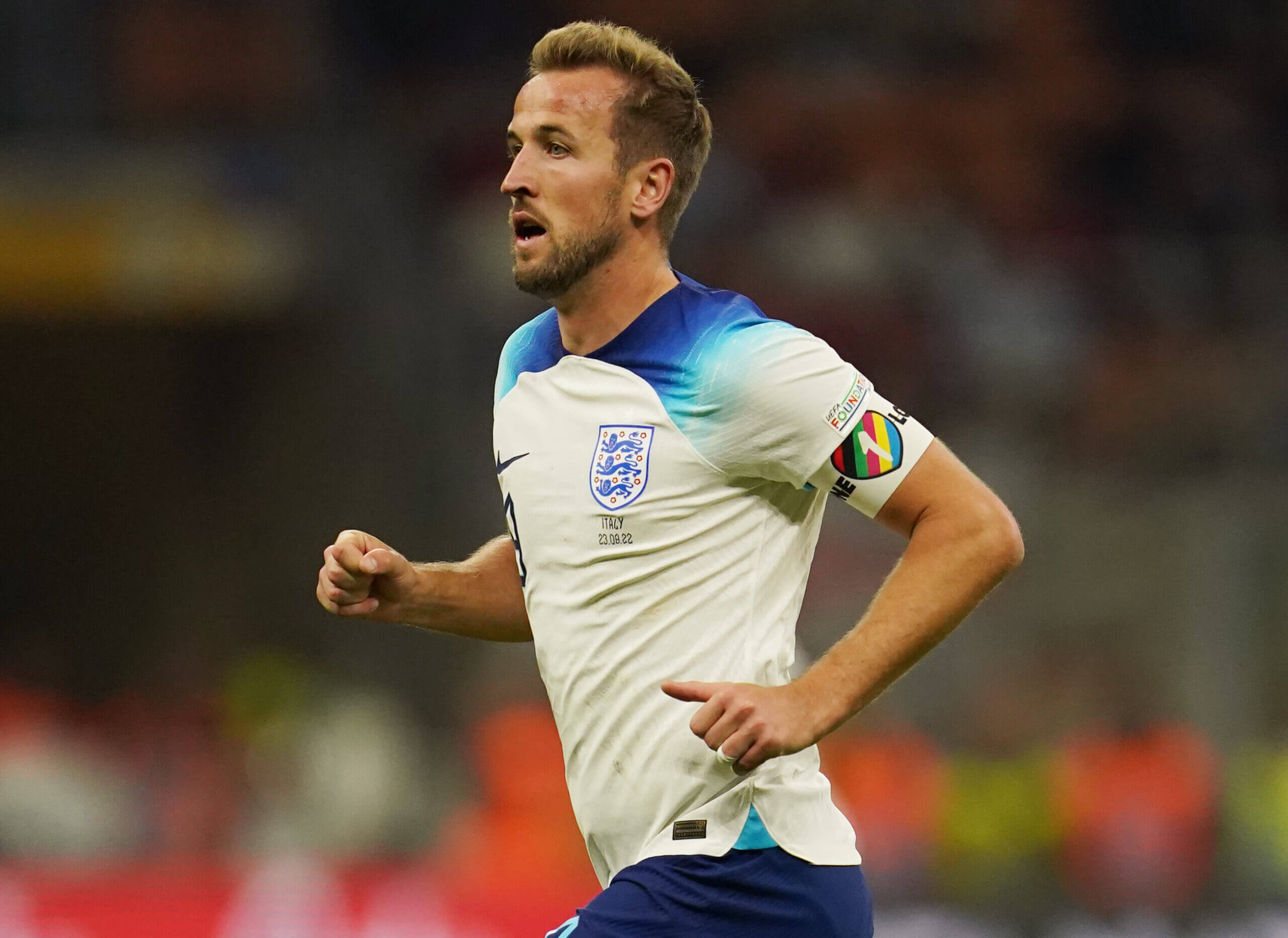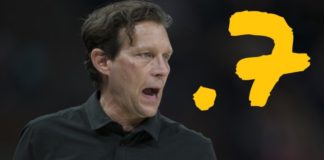Today, to quote the FIFA president Gianni Infantino, I feel gay.
Because to be gay is to feel that men’s football is not welcoming.
Because to be gay is to feel that men’s football will not stand up for you.
Because to be gay is to feel that men’s football will airbrush you.
Because to be gay is to feel that men’s football views your rights and freedoms as a bonus rather than an essential.
Advertisement
Because to be gay is to feel that men’s football perceives you as a nuisance.
Today, at the World Cup in Qatar, these feelings have rarely been more pronounced.
On Monday lunchtime, just a matter of hours before England were due to begin their World Cup campaign against Iran, a group of seven European football associations issued a joint statement to say they had backed down on a pledge to wear a OneLove armband at the tournament in Qatar.

England, Belgium, Holland, Switzerland, Denmark, Germany and Wales had all announced in October, to much fanfare, that they would wear the OneLove armband. This was interpreted by many media organisations as a defiant gesture of solidarity with LGBT people who are criminalised in Qatar. It was also seen to represent the thousands of LGBT people from around the world who decided they would not risk attending a tournament in a state that perceives the way we are born to be an ailment.
Many LGBT people, however, viewed even the original OneLove armband as too vague and lacking clarity. The design of the armband was not recognisable as one of the common rainbow patterns used to represent LGBT people. The OneLove term stopped short of directly mentioning LGBT rights or any direct language. Indeed, it was described by the organisations as an “anti-discrimination” armband rather than a rainbow armband. When I joined a Zoom panel last week organised by the LGBTIQ+ Human Rights Sports Coalition, the consensus view on the armband (full disclosure: also offered by myself) appeared to be that it was an underwhelming gesture but better than nothing. The hope was that players and managers may embolden the vagaries of the armband by speaking directly in Qatar about the penalising laws and their sympathy for LGBT fans who have stayed home.
As it turns out, the conversation changed quite dramatically over the weekend. Only on Friday, the English Football Association’s chief executive Mark Bullingham told Sky News his organisation was committed to the gesture. He said: “I think there’s a possibility that we might be fined. And if we are, then we’ll pay the fine. We think it’s really important to show our values. And that’s what we’ll be doing.”
[embedded content]
However, FIFA had not replied to a letter sent several months ago informing it that the European associations would wear the armband in Qatar.
Advertisement
FIFA then complicated matters further by announcing its own armbands for this competition, using even more generic slogans, on Saturday.
“Football unites the world” and “Share the meal”, among other social messages, were some of the suggestions, as well as a “No Discrimination” armband for the quarter-finals. There would be no design or slogan that goes near the matter of LGBT rights, however.
In the face of such mischief, the original and rather meek OneLove armband began to assume greater meaning. Admittedly, it was not quite akin to throwing the first brick at Stonewall, but the national FAs continued to insist they would stand up against FIFA and use the OneLove design in some way linked to the LGBT community.
Yet on Sunday evening, the resistance melted away. The European associations became concerned after a story emerged in the German newspaper Bild suggesting that captains who wear the OneLove armband may receive a yellow card for not wearing the correct tournament attire, including the FIFA-designated armbands. FIFA argues privately that the rules were always there to be found for the European associations, while the associations argue that the threat of a yellow card was thrust upon them at the final moment.

Faced with the prospect of starting matches with a yellow card for their captains, the seven associations took an unanimous and swift decision to backtrack on their pledge to speak up for LGBT people during the tournament. The truth of exactly what happened over the last 24 hours may unpack itself over time. One version is that the national FAs simply had not read the rules closely enough and, upon discovering the true potential of the sanctions, reneged on a promise to LGBT people. The counter-version is that FIFA, fearful of upsetting its Qatari hosts, made clear that a risk of a yellow card was real.
Advertisement
As such, in a matter of hours, all on-field representation or visibility for LGBT people at this World Cup dissipated. In doing so, we discovered national associations were willing to support the cause, in vague terms, only in so far as to the point where there may be an element of heightened personal cost in doing so.
On that decision, many will be split. Some will say that it is unfair to expect players to play on a yellow card at a World Cup (although reading that sentence aloud does feel a bit lame).
A personal view is that the sight of captains such as Virgil van Dijk and Harry Kane receiving yellow cards in full sight of global television cameras would have represented a historic moment for gay representation both within football and in the Middle East. It would have been a moment of sincere and striking allyship. To start a match with a yellow card would, symbolically at least, have given these players and watching fans the merest insight into the jeopardy and tightrope of gay life for so many people, knowing that one misstep, one wrong decision, one wrong movement could come at a cost. That is perhaps a glib and clumsy comparison — penalties for gay people in Qatar are more significant and real than a potential red card — but as a metaphor, it would be powerful. Others pointed out that players often risk yellow cards for less edifying things, whether they be diving or abusing referees. Protests, of course, are supposed to be uncomfortable, they are supposed to contain risk. Otherwise, some would argue they are simply PR.
The truth, however, is that this goes far further than a World Cup in Qatar and poses questions of the commitment of men’s football to creating a more safe and inclusive environment for LGBT people. There are very few openly gay male footballers. The Australian Joshua Cavallo revealed he is gay last year and when asked about the location of this year’s World Cup, he said: “At the end of the day the World Cup is in Qatar and one of the greatest achievements as a professional footballer is to play for your country, and to know that this is in a country that doesn’t support gay people and puts us at risk of our own life, that does scare me and makes me re-evaluate — is my life more important than doing something really good in my career?”
When a player believes he has reason to doubt his safety playing at a World Cup, when LGBT fans stay away, when FIFA blocks representation, it is hard to conclude anything other than professional football is therefore failing in its duty of care to LGBT people.

That failing is present at this World Cup but we should not pretend, either, that English football is a nirvana for gay football fans. There is some progress. Blackpool’s Jake Daniels, aged 18, was recently the first active British male professional footballer to come out for 30 years and most clubs now have LGBT supporters’ groups . Yet one of the more entertaining aspects of Qatari officials being asked about gay supporters in Doha is whether couples would be allowed to hold hands, when the reality is there are very few stadiums across England where gay couples feel comfortable to do so, such is the culture of that still pervades football grounds.
Then, of course, there is the contradiction of England’s players standing up for LGBT rights in Qatar, but some of England’s own players, such as Jack Grealish, Kyle Walker and John Stones (Manchester City) or Nick Pope, Kieran Trippier and Callum Wilson (Newcastle) are being paid by funds linked to Gulf state regimes that also criminalise homosexuality. And maybe let us not forget that Harry Kane, the England captain who was set to wear the armband, spent much of last summer attempting to sign for Manchester City as well.
Advertisement
While the English Football Association and Premier League seek to promote more inclusive environments, the Premier League welcomes cash from states that commit flagrant human rights abuses. The FA, meanwhile, in 2018 signed two Memoranda of Understanding: one with the Qatar Football Association and one with the Qatari Supreme Committee for Delivery and Legacy of the World Cup.
The English FA chairman Greg Clarke posed alongside Sheikh Hamad Bin Khalifa Bin Ahmed Al-Thani, President of the Arabian Gulf Football Association. The pair swapped jerseys sporting each other’s names and the No 22 to represent the year of the Qatar World Cup. Clarke did so while standing in front of an advertising board that, and here is the punchline, bore the English FA’s “Football for All” logo. The memoranda remain intact to this day.
No gay supporters were consulted before the English FA signed those agreements. And the English FA did not directly answer a question on Monday afternoon from The Athletic to say whether any LGBT people were consulted before the FA made the decision to abandon the armband on Monday morning. Instead, the English FA simply said the decision was made quickly by the nations.
But there, in a nutshell, is an encapsulation of football’s relationship with LGBT people, even in 2022. It is an industry where LGBT people go often unheard and almost entirely unseen. And days like today provide some clarity as to why.
(Photo: Sebastian Gollnow/picture alliance via Getty Images)








